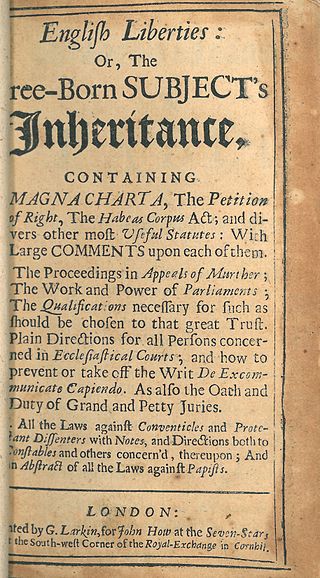Related Research Articles

Samuel Chandler was an English Nonconformist minister and pamphleteer. He has been called the "uncrowned patriarch of Dissent" in the latter part of George II's reign.

Richard Challoner was a leading figure of English Catholicism during the greater part of the 18th century, and the titular Bishop of Doberus. In 1738, he published a revision of the Douay–Rheims translation of the Bible.
John Gother, also known as John Goter, was an English convert to Catholicism, priest, controvertist and eirenicist.
Hugh Tootell was an English Catholic historian. He is commonly known under his pseudonym Charles Dodd.
Louis de Sabran or Lewis Sabran was a French Jesuit. He was associated with the court of James II of England and engaged in vigorous theological debates with both Anglican and Puritan spokesmen.

Richard Smallbrooke was an English churchman, Bishop of St David's and then of Lichfield and Coventry.

Elizabeth Cellier, commonly known as the "Popish Midwife", was a notable Catholic midwife in seventeenth-century England. She stood trial for treason in 1679 for her alleged part in the "Meal-Tub Plot" against the future King James II, but was eventually freed. Cellier was later imprisoned for allegations made in her 1680 work Malice Defeated, in which she recounted the events of the alleged conspiracy against the future King. She later became a pamphleteer and advocated for advancements in the field of midwifery. Cellier published A Scheme for the Foundation of a Royal Hospital in 1687, where she outlined plans for a hospital and a college for instructions in midwifery, as well as proposing that midwives of London should enter into a corporation and use their fees to establish parish houses where any woman could give birth. Cellier resided in London, England until her death.
Thomas Codrington (died 1691?) was an English Roman Catholic theologian. He is chiefly known for his attempt to introduce into England the "Institute of Secular Priests Living in Community", founded in Bavaria by Bartholomaus Holzhauser.
Thomas Jones was a Welsh librarian, who was librarian of Chetham's Library in Manchester from 1845 to 1875.

Thomas Comber (1645–1699) was an English churchman, Dean of Durham from 1689.

Henry Care (1646–1688) was an English political writer and journalist, or "Whig propagandist", whose speciality was anti-Catholicism.
William Clagett (1646–1688) was an English clergyman, known as a controversialist.
Thomas Fairfax, D.D. (1656–1716), was an English Jesuit.
Edward Gee (1657–1730) was an English churchman, known as a controversialist, and later successively Dean of Peterborough and Dean of Lincoln.
John Kirk D.D. (1760–1851) was an English Roman Catholic priest and antiquary.
Luke de Beaulieu was a Huguenot exile and cleric in England.
Thomas Lathbury was an English cleric known as an ecclesiastical historian.
Abednego Seller (1646?–1705) was an English non-juring divine and controversial writer.
Lime Street Chapel was a Roman Catholic place of worship in the City of London, in use during a short period of the reign of James II and VII of Great Britain.
References
- 1 2 Burton, Edwin Hubert (1908). . Catholic Encyclopedia . Vol. 4.
- ↑ Francis Peck, Catalogue of Popery Tracts (1735), ed. Thomas Jones (Chetham Society, 1859)
- Attribution
 This article incorporates text from a publication now in the public domain : Burton, Edwin Hubert (1908). "William Darrell". Catholic Encyclopedia . Vol. 4.; The entry cites:
This article incorporates text from a publication now in the public domain : Burton, Edwin Hubert (1908). "William Darrell". Catholic Encyclopedia . Vol. 4.; The entry cites: - Henry Foley, Records of the English Province of the Society of Jesus (London, 1878), III, 477, VII, i, 196;
- Francis Peck, Catalogue of Popery Tracts (1735), ed. Thomas Jones (Chetham Society, 1859);
- Joseph Gillow, Bibl. Dict. Eng. Cath. (London, 1886), II;
- Thompson Cooper in Dictionary of National Biography (London, 1888), XIV.